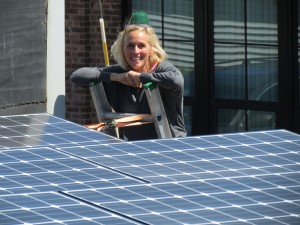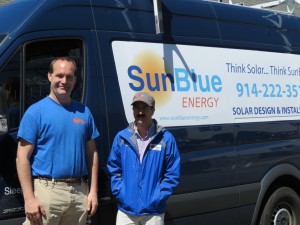Commercial businesses hesitant to go solar in Westchester
Lisa McCullagh, founder and owner of Pleasantville-based Scarborough & Tweed, said the decision to install solar panels seemed daunting and scary at first.
“How do you do this? Do you buy it? Do you lease it?” were just some of the questions McCullagh said she had when looking for ways to make her corporate-gifts manufacturing business more eco-friendly.
And she”™s not the only business owner with concerns about making an investment of what is usually thousands of dollars in photovoltaic technology that converts sunlight into electricity.

- Lisa McCullagh, founder and owner of Pleasantville-based Scarborough & Tweed. Photo by Colleen Wilson
Small commercial businesses in Westchester County make up only 29.5 percent of solar installations that create fewer than 200 kilowatts per hour, according to recent statistics from the New York State Energy Research and Development Authority.
The data, collected since December 2000, found that residences make up 67.7 percent of the installed solar market in the county, and the remaining sectors ”” industrial, nonprofit and government ”” account for 2.7 percent.
While there are a variety of financial incentives that make the investment favorable for businesses, getting through the weeds of the tax code is no small feat for owners of small commercial ventures.
At the federal level is a 30 percent investment tax credit, in which businesses and homeowners that install small-scale solar systems will get a dollar-for-dollar reduction on income taxes for 30 percent of their investment cost.
The investment tax credit is part of the Energy Policy Act of 2005. The latest renewal, in 2008, kept the tax credit going for eight more years. Unless it is renewed again, the incentive will diminish on Dec. 31, 2016, effectively lowering the commercial credit to 10 percent and eliminating it for homeowners.
The federal incentive tax credit is what Barrett Silver, senior vice president of sales and marketing at Sleepy Hollow-based SunBlue Energy, called the “lion”™s share” of the incentive programs that appeal to commercial businesses.
“In addition to the 30 percent investment tax credit, there”™s also a very generous depreciation available for tax-paying commercial entities where they can basically double down and get another 30 or so percent back just by depreciating the investment of the system,” he said.
New York offers a similar rebate program called NY-Sun Incentive Program. Westchester County, along with six other counties including Rockland and Ulster, also chose to exempt local sales tax on solar energy equipment purchases. However, four Westchester jurisdictions ”” Mount Vernon, New Rochelle, White Plains and Yonkers ”” opted out and have a 2.5 percent sales tax on solar installations.
It”™s this tax-heavy complexity that Silver said can deter small businesses from going solar, while favoring other companies that “have tax lawyers at their beck and call and can make themselves aware of it and take advantage of it.”
McCullagh said she looked to SunBlue to communicate the government rebates and walk her through the installation process when she hired the company to install Scarborough & Tweed”™s 51.3 kilowatt solar energy system. But McCullagh, whose solar panels were installed in March, said it was still a tough decision because no matter how you look at it “you do have to put up some financial investment” at the outset.

- From left, SunBlue Energy”™s Chris Hale, founder, and Barrett Silver, senior vice president of sales and marketing. Photo by Colleen Wilson
But the investment McCullagh made should pay for itself in three to five years, Silver estimated, adding that residential customers might not pay back their solar investment for roughly five to eight years.
Another feature of solar panel installations is net metering, a process that disperses extra energy generated into the electrical utility grid and gives a market-rate credit to the company whose solar installation created the surplus power.
Silver said other concerns he hears from clients are about whether their company is eligible for tax credits.
“For some small companies in this area, they”™re concerned that they maybe can”™t take full advantage of the tax benefits that are associated with the solar incentives because they”™d have to show profitability” on their tax return to claim the credit that year, he said.
However, companies that may have trouble paying for a solar project can start to take advantage of a growing solar financing plan called power purchase agreements.
A power purchase agreement allows a third party to develop and own the solar panel system but use a host customer to provide the space for the system. The arrangement typically allows the host to benefit from the lower electricity costs without having to pay for the upfront installation costs.
Silver said SunBlue is “at the beginning of a process” to begin offering this type of plan.
“We can design and install the system on their location and offer them a discounted price for the electricity the solar array produces,” Silver said, adding that “we can lock them in at a lower rate at the outset and show them savings without ever being cash negative.”